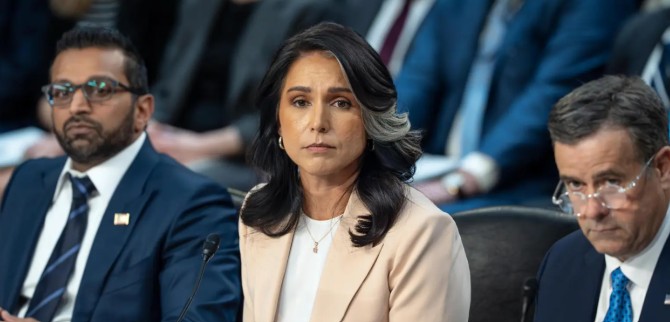U.S. House Intelligence Committee Hearing: Intelligence Chiefs Grilled on Global Security Threats

Top U.S. Security Officials Face Scrutiny Amidst New Revelations
U.S. Director of National Intelligence Tulsi Gabbard and CIA Director John Ratcliffe are once again facing intense questioning on Capitol Hill, as they testify before the House Intelligence Committee today. The hearing comes at a pivotal moment, with new revelations shaking up the proceedings. Newly unearthed text messages from a group chat of senior Trump administration officials have surfaced, revealing sensitive discussions about military operations in Yemen, adding pressure to the already high-stakes testimony.
The texts, obtained and published by The Atlantic, reveal discussions between top Trump officials about plans to strike targets in Yemen. Among those involved in the chat were key figures such as Defense Secretary Pete Hegseth, who is seen providing detailed and sensitive information about the timing of military operations, including the specifics of fighter jet departures and the types of weapons to be deployed.
New Signal Texts Shake Up the Hearing
The emergence of these new text messages has injected a fresh layer of controversy into the House Intelligence Committee’s ongoing investigation into global security threats. The group chat’s contents suggest that the discussions regarding military strikes were far more detailed and sensitive than previously known, including real-time communications on operational plans that could jeopardize U.S. national security.
As the text messages continue to unfold, the committee is focusing on the implications of these revelations for both U.S. foreign policy and domestic security. The new disclosures are further complicating the already contentious relationship between the intelligence community, lawmakers, and the Trump administration’s handling of classified information.
Intel Chiefs Address Escalating Global Threats
As part of the hearing, Gabbard and Ratcliffe were called upon to address not only the implications of the newly surfaced text messages but also the broader global security landscape. With ongoing threats from geopolitical hotspots like Yemen, North Korea, and Iran, intelligence leaders have had to navigate an increasingly volatile environment while maintaining the integrity and security of U.S. operations.
Gabbard, who has been outspoken on foreign policy issues, underscored the importance of transparency and accountability in intelligence operations. “We must ensure that our actions abroad reflect our values and do not undermine our national security or the integrity of our intelligence community,” Gabbard stated during her testimony.
Meanwhile, Ratcliffe’s testimony was largely focused on the broader context of global threats, including cybersecurity risks, Russian disinformation campaigns, and the evolving challenges posed by China. He reaffirmed the need for heightened vigilance and strategic investments in national defense to maintain U.S. dominance on the global stage.
The Fallout of Sensitive Military Discussions
The newly released texts have raised eyebrows over the level of detail discussed in unsecured communications, and some are questioning whether this mishandling of classified information could lead to security breaches. While the discussions about military strikes on Yemen were not classified in the traditional sense, the granularity of the details shared in the group chat poses risks that could affect U.S. strategic operations and international relations.
In particular, critics have pointed out the potential dangers of leaking sensitive military information, such as the specific timing and nature of military actions, which could allow adversaries to adjust their own plans or retaliate in unexpected ways. The Atlantic’s publication of these messages has sparked concerns about the security protocols surrounding such sensitive communications.
Accountability and Oversight: A Crucial Moment for the Intelligence Community
The timing of these revelations could not be more critical, as lawmakers seek to hold intelligence agencies accountable for their handling of classified information, particularly during a period of heightened international tensions. The House Intelligence Committee, which has the responsibility of overseeing the U.S. intelligence agencies, is expected to ramp up its scrutiny of these new disclosures and demand answers from top officials about how sensitive material is being handled and whether proper protocols were followed.
In light of the new developments, the hearing is likely to have lasting implications for both the intelligence community’s operations and the ongoing conversation about accountability, transparency, and oversight in U.S. security affairs.
Conclusion: A Tense Moment for U.S. National Security
The testimony of Tulsi Gabbard and John Ratcliffe before the House Intelligence Committee, combined with the release of sensitive text messages, has created a volatile environment for U.S. national security discussions. As intelligence leaders are held to account for their roles in handling sensitive information, the full ramifications of the emerging Yemen strike plans remain to be seen. The committee’s next steps will likely involve further investigations into how these communications could have impacted U.S. security interests and what measures are needed to safeguard against future breaches.
